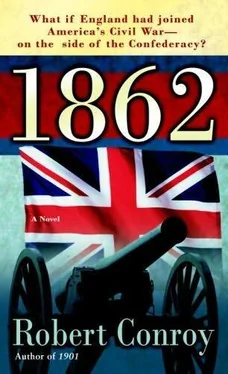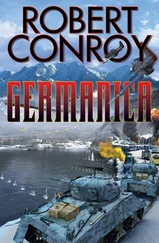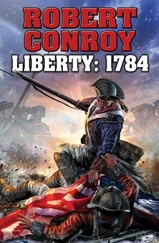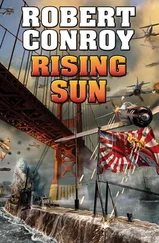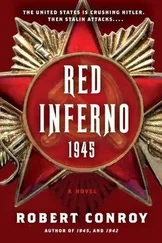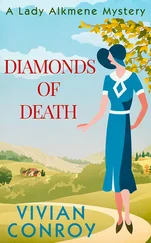Robert Conroy - 1862
Здесь есть возможность читать онлайн «Robert Conroy - 1862» весь текст электронной книги совершенно бесплатно (целиком полную версию без сокращений). В некоторых случаях можно слушать аудио, скачать через торрент в формате fb2 и присутствует краткое содержание. Жанр: Альтернативная история, на английском языке. Описание произведения, (предисловие) а так же отзывы посетителей доступны на портале библиотеки ЛибКат.
- Название:1862
- Автор:
- Жанр:
- Год:неизвестен
- ISBN:нет данных
- Рейтинг книги:5 / 5. Голосов: 1
-
Избранное:Добавить в избранное
- Отзывы:
-
Ваша оценка:
- 100
- 1
- 2
- 3
- 4
- 5
1862: краткое содержание, описание и аннотация
Предлагаем к чтению аннотацию, описание, краткое содержание или предисловие (зависит от того, что написал сам автор книги «1862»). Если вы не нашли необходимую информацию о книге — напишите в комментариях, мы постараемся отыскать её.
1862 — читать онлайн бесплатно полную книгу (весь текст) целиком
Ниже представлен текст книги, разбитый по страницам. Система сохранения места последней прочитанной страницы, позволяет с удобством читать онлайн бесплатно книгу «1862», без необходимости каждый раз заново искать на чём Вы остановились. Поставьте закладку, и сможете в любой момент перейти на страницу, на которой закончили чтение.
Интервал:
Закладка:
There were rumors of ironclads being built on the Union part of the Mississippi, and at least one was definitely under construction in New York. Palmerston understood that iron and steam defined the navy of the future, but he saw no threat from the Union ships. The Union ironclads were too small to be effective and would be confined to shallow waters. They would not challenge the Royal Navy and its iron-hulled battleships theWarrior and theBlack Prince. TheWarrior and her twin were the largest and most powerful ships in the world. She would be sent to American waters to impress both the Union and the Confederacy with the power of England's navy. TheBlack Prince would remain in English waters.
No. the Royal Navy would acquit itself quite well, Palmerston concluded.
The problem, as Palmerston saw it, was with the wretched condition of the British army. On paper it seemed formidable, but that was misleading. There were more than two hundred thousand men in the army, but far too many were scattered across the world in small garrisons where their presence was needed to protect Imperial interests. Thus, there were few reserves to draw on.
Worse, many regiments were at less than full strength. Britain depended on volunteers to fill her army's ranks, and the last war, the Crimean War, had been an unpopular one. It had shown the horrors of war and the inadequacies of the British military medical system, which left thousands of British men to die of disease and neglect.
So, while there were many who supported the war, they did not favor it to the extent that they were willing to enlist and risk their lives. There had been an initial burst of enlistments, but that had died down quickly. Anger towards the Union did not extend to reliving the horrors of the Crimea.
“Canada is our Achilles' heel,” Palmerston mused. “We must reinforce Canada. The Americans have tried twice in the last two wars to take it, and they will surely do so again. It is the only part of the empire they can reach, and it is a part of our empire that is most important to us. In the long run. it might even be more important than India. The last time the Americans tried, in the War of 1812, they attempted it with only a couple of thousand men and almost succeeded. Now they can send thirty or forty thousand against it.”
Lord Russell nodded. “What do we have there at the present?”
“Five regiments of British regulars plus one regiment of Canadian regulars. Barely a corporal's guard. Should the Union get it into their head to invade, there would be little to stop them. I have, however, taken some steps. On receipt of the information regarding theTrent, I sent a message to Canada to call out the militia and prepare for invasion. Between the regulars and the militia, there might be fifty thousand men to defend all of Ontario and Quebec, with damned little left to protect the rest. We must not lose Canada!''
It was unnecessary for him to add that the citizens of Canada, both English and those of French heritage, had been close to rebelling against Mother England. They were tired of a lack of representation in London, and negotiations were ongoing to give them semi-independent status. Palmerston feared losing Canada as Britain had lost the American colonies, and for the same reasons.
Russell was surprised. “Are you having second thoughts, Prime Minister?”
“No, but I admit I am concerned about time and distance. I have ordered several squadrons of warships to American waters both to open the Southern ports and to protect our small squadron in the Caribbean. We cannot have the Caribbean squadron overwhelmed and the United States given a victory on a platter. I have also ordered a number of Scottish regiments under General Sir Colin Campbell to report to Canada. It galls me that it will take two months to get them organized and supplied, find proper shipping, form up a convoy, and then get them to Canada. By that time, Union forces could be marching through the streets of Ottawa.”
“Do you really think that will happen?”
Palmerston chuckled. “No, I do not. I expect that Mr. Lincoln and his government will be paralyzed and indecisive, thus letting the window of opportunity close. By the way, General Campbell will report to the overall commander, Lord Cardigan.”
Russell winced. “Is that wise?”
Cardigan had been a controversial figure in the Crimean War and was held at least partly to blame for the failure of the Light Brigade's attack on Russian positions. He was unpopular with his fellow officers, querulous, stubborn, and argumentative.
“At the moment, he is the best choice available. As in previous conflicts with the United States, several general officers have declined to participate. We will control Cardigan, which brings up another point. We need the Atlantic cable.”
Two attempts had been made to connect North America with Europe by means of a telegraph cable. The first had failed utterly, but the second attempt had been a partial success. Signals had been transmitted back and forth for several weeks until they became weak, distorted, and finally ceased.
“It now takes ten days for a message to cross the ocean in a fast ship,” Palmerston said. “Presuming, of course, that a fast ship is available and that neither bad weather nor mechanical problems develop. That is intolerable. We can communicate with virtually every major city by telegraph except those in the Americas. The good shipAgamemnon was our half of the cable-laying enterprise, and I have directed her to seek out and repair the damage. She is at sea as we speak.”
“Excellent,” said Russell. “Although not having swift communications with Washington served us well in the past weeks. Think of what might have occurred had Ambassador Adams been able to contact Lincoln with the news of our taking of theSt. Lawrence. Lincoln might have called it a quid pro quo and pushed harder for a peace that we might have had to accept. God knows Adams did.”
Ambassador Adams had virtually gotten on his knees in front of Palmerston to make the case that, since each nation had lost a ship, honor had been satisfied. This viewpoint had been iterated in Parliament by Palmerston’s opponents and by opposition newspapers. The attack by theGorgon on the smaller American ship had managed to dampen some people's enthusiasm for the war, although others thought it was a grand start to an ultimate victory.
“You are correct, of course,” Palmerston said, “but now we need communications. Along with the declaration of war, I have sent Ambassador Lyons in Washington notification that he is to proceed to Richmond and be our representative there.”
Russell arched an eyebrow at the terminology. “But not ambassador?”
To call Lyons an ambassador would mean that Great Britain had officially recognized the existence of the Confederacy as a sovereign nation. This was what the Confederacy desperately wanted. However, after almost a year into its existence, no major nation had officially recognized it.
“We are not quite ready to recognize the Confederacy as a sovereign state. I have had several notes from our beloved Queen Victoria, who, despite her anguish over Prince Albert's most recent death, has managed to make her views known on the issue. Although she dislikes the Union for its arrogance, rudeness, and crass commercialism, she considers a formal alliance between ourselves and a nation that condones slavery to be most repugnant. She said she would do all in her considerable powers to stop such an alliance and I am afraid she would succeed. The queen may only reign and not rule, but she is beloved and has enormous moral influence. No, there shall be no recognition and no alliance at this time.”
“So what are you planning?” Russell asked. He was confident that Palmerston had something planned. Palmerston always planned.
Читать дальшеИнтервал:
Закладка:
Похожие книги на «1862»
Представляем Вашему вниманию похожие книги на «1862» списком для выбора. Мы отобрали схожую по названию и смыслу литературу в надежде предоставить читателям больше вариантов отыскать новые, интересные, ещё непрочитанные произведения.
Обсуждение, отзывы о книге «1862» и просто собственные мнения читателей. Оставьте ваши комментарии, напишите, что Вы думаете о произведении, его смысле или главных героях. Укажите что конкретно понравилось, а что нет, и почему Вы так считаете.
